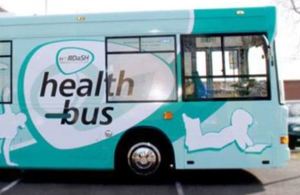Identifying and treating tuberculosis (TB) in under-served groups
Using the Doncaster health bus to reach asylum seekers and refugees.

Doncaster Health Bus
Summary
Rotherham, Doncaster and South Humber NHS Trust used their health bus to reach and engage with asylum seekers and refugees. This enabled the TB team to provide advice and support for clients undergoing treatment for active and latent TB, and latent TB screening of new entrants from high incidence countries.
What was involved
The health bus in Doncaster is owned by Rotherham, Doncaster and South Humber NHS Trust and is used by different health teams to connect with people who traditionally do not access health promotion advice and activities.
Certain groups are disproportionately affected by TB and this under-served population includes refugees and asylum seekers. The local TB team started to use the bus in 2015 to visit the Doncaster Conversation Club (DCC) – a weekly group for refugees and asylum seekers who want to practice their English and get more support.
Doncaster is not a high-incidence TB area but it does have pockets of high-risk people who the TB team are trying to engage with. The health bus is parked outside the DCC on a bi-monthly basis and the TB team screen refugees and asylum seekers who may find accessing health care difficult.
The team use Interferon Gamma Release Assay (IGRA) test to screen for latent TB. From April 2015 to March 2016 (6 sessions) the team tested 104 individuals and 27% were found to be positive for latent TB. One patient had active TB. Of the 28 positive tests, 82% have completed or are currently undergoing treatment.
Katie Jenkins, TB Nurse, Rotherham, Doncaster and South Humber NHS Trust said:
Screening on the health bus, at the Conversation Club in Doncaster, is becoming ingrained within the culture of our local asylum seeking population. Previous clients are informing new peers of the service offered and why it is important to seek advice about TB and screening.
What worked well
Overall, 64% of those who tested positive for latent TB had been in the UK for less than a year. The support of this team has led to 82% of clients either completing or receiving treatment for latent TB. Using the health bus has enabled the TB team to:
- target under-served population in one place
- engage with this population in a setting where language support is available
- reach people who can drop in without an appointment
- build trust and relationships
- be a point of contact for follow-up care
Next steps
The service has since engaged with local sexual health services to attend at the same sessions. The majority of clients attending for TB screening are also taking up the offer of HIV testing alongside the IGRA TB blood test. This model has proved to be very successful to engage with certain under-served groups. Doncaster is a low incidence area for TB and therefore not eligible to any funding as part of the New Entrant Latent TB Screening Programme. Screening continues within existing resources.
Further information
Contact the project lead Katie Jenkins, TB Nurse, Rotherham, Doncaster and South Humber NHS Trust. Email [email protected]